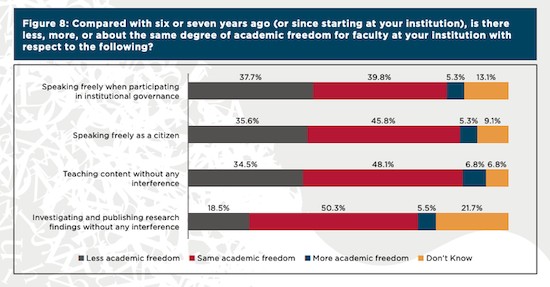About a third of higher education faculty say they perceive less academic freedom for faculty at their institution when it comes to the ability to teach content without any interference, speak freely when participating in institutional governance or speak freely as a citizen, compared to six or seven years ago or since starting at their institution.
This information comes from a national study that was done by the American Association of Colleges and Universities in partnership with the American Association of University Professors. The survey’s focus was on individuals who had any instructional duties and/or served in a faculty role at any two- or four-year public or private U.S. college or university between December 2022 and December 2023.
“At its core, academic freedom is about the ability of colleges and universities to serve their public purpose and to advance the common good,” the study’s authors write in their Concluding Thoughts and Recommendations section. “We have taken care in this study to not conflate principles of academic freedom — intended to ensure the unfettered pursuit of knowledge within educational spheres — with the right of freedom of expression or speech that protects the ability to put forth ideas within the public sphere. Yet, while the concepts of academic freedom and freedom of expression or speech should be understood as distinct, there is also reason to see them as related.”
They add, “The pursuit of knowledge does not happen apart from communities; it happens within them, alongside public spheres and the private lives of community members.”
To view and download “Academic Freedom and Civil Discourse in Higher Education: A National Study of Faculty Attitudes and Perceptions,” click here.

